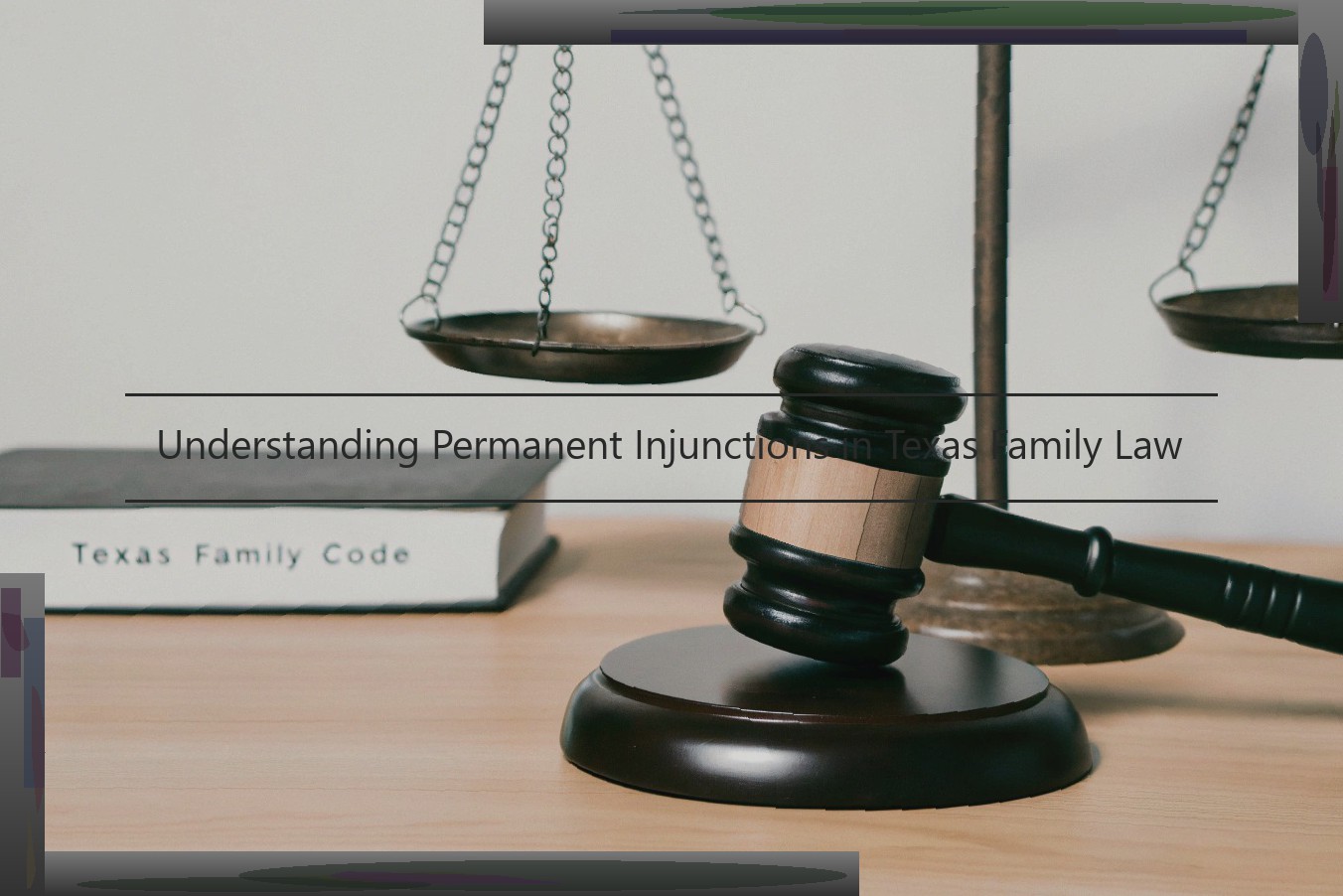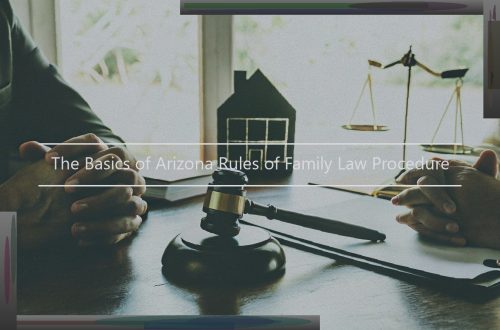Understanding Permanent Injunctions in Texas Family Law
What is a Permanent Injunction?
A permanent injunction in Texas family law is an order issued by a court that permanently enjoins or prohibits the respondent from committing a specific act. In Texas, the statutory authority for a permanent injunction is found at Tex. Fam. Code § 6.502, absent proof of family violence, in which case the party seeking the injunction may proceed under the general civil family violence statutes codified at Tex. Fam. Code § 85.001 ("Motion for Protective Order") or § 6.504 ("Request for Protective Order in Suit Affecting Marital Status"). However, a motion for temporary injunction may be filed for matters relating to the conservatorship or possess of the child under Tex. Fam. Code § 105.001.
A permanent injunction in Texas family law cases is often used to address conflict involving control over the child’s primary residence , move away and do not remove restrictions on rights or duties regarding the child. A permanent injunction is enforceable through contempt or a court may designate certain acts as "constructive" contempt.
Tex. Fam. Code § 105.001 requires the trial court to state the acts found to be in violation of the permanent injunction with sufficient specificity to put the person on notice of the conduct being prohibited.
Typically, only issues of custody, rights and duties, child support, spousal maintenance and division of property are subject to permanent injunctions in Texas.

Permanent Injunctions in Family Law Cases
An injunction is a significant and powerful order of the court that generally forbids or requires a certain action by one of the parties. A permanent injunction in a family law case generally occurs upon or after the final hearing in the case, and as it is a permanent injunction, continues indefinitely thereafter unless modified or dissolved. Permanent injunctions are common in those cases where one party to a lawsuit is abusing their powers in some way over the other party or in some way manipulating a joint asset. A common example of a case where one party is abusing their powers would be in the case of an Overspend Order, where one party is abusing their powers to suffer harm to the community estate or to the other party.
In the case of an Overspend Order, the Court may issue a permanent injunction on the following grounds: "Because the award of the community property was a division of the estate, the trial court did not abuse its discretion by enjoining that former spouse from depleting the value of the estate through community credit card debt." In order to grant a spouse’s request for a permanent injunction after final hearing, the trial court "must find that the complainant will be injured by future wrongful acts of the defendant unless the order is granted." Without proof that a spouse will commit wrongful acts after a property division in divorce is ordered, the trial court is without authority to require a spouse to terminate wrongful acts not related to the fortuitously acquired property." To justify an order prohibiting a spouse from committing wrongful acts unrelated to the property awarded to him or her, some courts have required a showing that the enjoined wrongful acts would lessen or reduce the value of otherwise nonfortuitously-acquired community property or would adversely adjudicate community property in some other manner.
Another common example of a permanent injunction would be to prohibit one party to have contact with the other party due to allegations of harassment or ongoing intimidation. "Anderson filed his application for a temporary restraining order and injunction on May 20, 2008, in which he alleged that Johnson intended to contact Minick at her place of employment, enjoining the parties from communicating with each other about any pending matters, including the divorce action pending in the 295th District Court of Harris County, Texas, or any other matters. . . . "The trial court[] ha[s] the authority to protect a party to the divorce from another party by issuing an injunction to ensure that parties do not engage in conduct that would place the other party in fear of physical abuse. Preventing a threat of harassment or intimidation is a valid purpose for which a court may grant an injunction."
Temporary Injunctions and Permanent Injunctions
In the Texas Family Code, the Court can issue temporary injunctions for several purposes, including temporary restraining orders and injunctions to prohibit the commission or continuance in any manner of any act in violation of a social or economic duty or in violation of a family relationship. However, a temporary injunction is not as permanent as a permanent injunction, nor is it intended to be such. The main difference between a temporary injunction and a permanent injunction is in their duration, the purposes for which they are available and the standard(s) necessary to obtain them. A temporary injunction is one intended to be issued only for a short and specific period of time under a well-defined strategy. Its purpose is to maintain the status quo until litigation can be concluded. A permanent injunction will be in place for a long period of time (usually until modified according to law) and does not serve to maintain the status quo, but to compel the defendant to actually do or refrain from doing the acts specified in the injunction. Texas courts do not normally issue permanent injunctions in the absence of some right or interest which requires protection. There is no permanent injunction available to prevent merely temporary or transient injury. The standard for obtaining a temporary injunction is different than the standard for obtaining a permanent injunction. To obtain a temporary injunction the requesting party must allege as a basis for the injunction that they have a probable, imminent, and irreparable injury to a legal right. The burden is placed on the requesting party in a temporary injunction to show probable, imminent, and irreparable injury to their legal rights. To obtain a permanent injunction the requesting party must show a joint conscious design to accomplish an unlawful purpose and to injure the requesting party. Accordingly, the final decision on a permanent injunction must await final determination of the cause and cannot be made on the basis of summary proceedings preliminary to the trial of the cause on the merits. The final decision on a permanent injunction is normally made by the trier of fact after full notice and an opportunity to plead and present evidence. TROs, temporary injunctions and the relief we will be discussing in the next section protect against numerous things, but when you are dealing with a divorce, separate and avoidable injury often takes the form of domestic violence. Of course, this is the type of behavior that the court seeks to prevent with a family violence protective order.
Obtaining a Permanent Injunction
Firstly, the injunction in question must be one the family court could already issue as part of its general powers. The relevant bar is found in Section 6.502 of the Texas Family Code, which enumerates the various types of injunctions family courts can legally issue to prevent specific behavior after the divorce proceedings have begun. This would include injunctions against either party creating debt or disposing of property without prior approval from the court.
Once the court determines whether the injunction is an appropriate one for a family court, the party requesting the injunction will need to have a hearing on it. The first step in the request for a permanent injunction is to file any necessary pleadings/motions in court. These will include a petition for a protective order, if necessary, an application for a temporary restraining order, and a request for a temporary injunction. The request for a temporary restraining order will be considered at the earliest possible time, so a request for a TRO should always accompany the other injunctive requests.
Then follows a hearing. If the TRO is granted, it will expire after 14 days unless extended. Any extension will last until the hearing for the issuance of a temporary injunction. If the temporary injunction is granted, then it will last until the final hearing on the case, where it may or may not be converted into a permanent injunction. At the final hearing, evidence will be presented and witnesses may be called to testify, allowing either party to explain to the court why or why not a permanent injunction should issue. Only after the evidence has been presented will a judge issue the permanent injunction.
Since there are sometimes multiple hearings on this issue, it is recommended that parties seeking a permanent injunction retain experienced legal counsel to draft these orders and represent them at these hearings.
Effects of Permanent Injunctions on Family Law Cases
Permanent Injunctions can have significant ramifications on the issues being referred to the judges who are trying the case. In many instances, judges of the 257th Judicial District have already ruled on specific items as they relate to either the temporary orders or the final orders in the case. The judge may have already made a ruling with respect to those same issues and may not be willing or able to change their opinion on the matter once he or she has ruled on it. It is important to be aware of the fact that if a judge has already ruled on an issue prior to the entry of a permanent injunction, there is a possibility that the person may be bound by that ruling for a very long time. How far does one want to test the limits of a judge, especially when it comes to a district court judge who has a very credible reputation? An attorney who has appeared before this judge and knows how they rule on a variety of matters is potentially not going to allow their client to be subjected to the wrath of a judge that they already know is not going to put up with any nonsense.
A permanent injunction may be useful in the following circumstance: The other reason to obtain a permanent injunction is to return the individual’s prior dignity and remove any allegations of inappropriate sexual misconduct that may have been raised in the final orders entered in the case. Rather than allow the individual to wear the scarlet letter that may be contentious and difficult to have cleansed from the person or brandished in front of the children , the final orders may be a more appropriate time for the parties to make a decision (assuming covenant wasn’t already signed) as to whether or not they wish to have the final orders expunged or discontinued. Often times our family law courts will find it to be in the best interest of the children to allow the continuation of an injunction that may prohibit certain behavior even though the person being restrained is no longer in the home and once they have left the home the need for the injunction is somewhat diminished because the parties are no longer at each other’s throats as they might have been during the time that they were living together.
A final injunction won’t help alleviate the stigma that is generated especially when the individual has been accused of some form of sexual misconduct; additional evidence would be needed to clear up what occurred and allow for the parties to move on with their lives. The court will not often enter a permanent injunction if it has not heard the evidence on the matter and made a substantive decision regarding the actions of the party and whether or not the person is continuing to engage in the inappropriate behavior (if they don’t trust the person enough to live together, why would they trust them to be apart from one another).
However if the conduct has only occurred one time and has not been repeated, and the person has had some form of counseling or therapy to deal with the issues or the character is otherwise separately impacted by not having the wrong label placed on them, the permanent injunction may be appropriate. Conversely, if the individual has a long history of inappropriate behavior, the permanent injunction may be the appropriate way to deal with the matter and keep their covenant in front of them.
Contesting a Permanent Injunction
In Texas, the right to challenge a permanent injunction is somewhat limited and is mostly accomplished through an appeal. However, you may be able to file a motion for new trial in the case that led up to the permanently enjoining the behavior of your spouse. If a motion for new trial is not granted, the question then becomes whether or not the permanent injunction has been violated.
To determine whether the permanent injunction has in fact been violated, the party seeking to enforce the order bears the burden of establishing that (1) the injunction is subject to enforcement by contempt; (2) the respondent violated the injunction; and (3) the respondent had notice of the violation upon which the court’s contempt powers may be invoked. The III Judicial District Court of Appeals has stated this as:
A civil contempt finding is appropriate if the pleadings and the proof show that (1) the court has a power to enforce its orders, (2) a portion of that power has been previously used, and (3) the party violating the order had notice of the order forbidding his conduct. (A civil contempt) order is valid if it places a person the knowledge of his duty under (the order), notices to the party of the act prohibited by the (order), and clearly specifies what acts the party must not perform. Additionally, the order must specify and limit the trial court’s contempt power by stating the precise act that is forbidden. A contempt order must be sufficiently specific so that a person of ordinary intelligence would have no basis to doubt that the conduct was proscribed. In this manner a court’s contempt power is limited to the power to insure obedience to orders lawfully issued by it. (Footnotes omitted).
Thus, if you believe that the permanent injunction entered against you is overly broad or ambiguous, then you may bring a motion for contempt. However, you should be aware of the fact that the granting or denial of a motion for new trial rests within the trial judge’s discretion, and, therefore, a trial judge’s ruling will not be disturbed on appeal unless a clear abuse of discretion is shown. Many trial judges are biased against a party filing a motion for new trial with regard to contempt of a permanent injunction. Thus, while such motion may be brought, you must be cautious about what judge you are dealing with, as some are biased in favor of the party bringing the motion.
Remember, the Texas Family Code states that:
"Any person who willfully violates a protective order issued under this chapter or a temporary injunction issued under Chapter 6.504 or 6.505 prior to September 1, 1995, is liable to any person injured, including a child younger than 18 years of age residing in the household, for the actual damages sustained or for $500, whichever is greater, court costs, and reasonable attorney’s fees, on any person injured, including a child younger than 18 years of age residing in the household, for any additional amount that the court deems proper."
Additionally, if you have violated the Court’s order and there is evidence to support this type of action, the Court must issue a protective order to ensure your compliance with the injunction. The Court will likely do this to avoid any unnecessary future questions or arguments over compliance with the injunction.
Seeking Legal Counsel for Permanent Injunctions
In situations that call for a permanent injunction, it is imperative that you seek the guidance of an experienced family law attorney. Given the complexity of family law matters, even a simple request for a permanent injunction can cause upheaval and financial hardship for one or both parties. While you can file for a permanent injunction pro se (without a lawyer), it is important to consider hiring a lawyer if you ever plan to make or respond to any sort of request for an injunction. An experienced family law attorney can provide assistance and help you determine the best course of action when it comes to the specific facts of your case. When hiring a lawyer in Texas, it is essential that you conduct thorough research to ensure you are getting someone who is qualified to handle your case. First , you will want to look into the educational background of each potential candidate. You may also want to find out if the lawyer has been named a "Rising Star" or "Super Lawyer" by any bar associations or lawyer organizations in your state. There are also online tools that rate lawyers on a scale. While not a guarantee, these can be very helpful in evaluating who you choose for your present legal matter. It is also important that you consult with several different lawyers before making any decisions about who will represent you. You will want to determine which lawyer best understands your needs and is most interested in assisting you. It is also vital that you consider the costs going forward so you have an idea what you will be able to afford, and whether the lawyer is willing to offer a payment arrangement.



